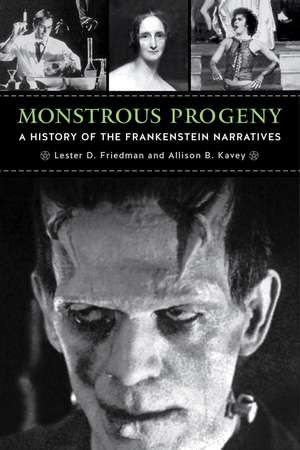Monstrous Progeny: A History of the Frankenstein Narratives
Autor Professor Lester D. Friedman, Professor Allison B. Kaveyen Limba Engleză Paperback – 31 iul 2016 – vârsta ani
Mary Shelley’s 1818 novel Frankenstein is its own type of monster mythos that will not die, a corpus whose parts keep getting harvested to animate new artistic creations. What makes this tale so adaptable and so resilient that, nearly 200 years later, it remains vitally relevant in a culture radically different from the one that spawned its birth?
Monstrous Progeny takes readers on a fascinating exploration of the Frankenstein family tree, tracing the literary and intellectual roots of Shelley’s novel from the sixteenth century and analyzing the evolution of the book’s figures and themes into modern productions that range from children’s cartoons to pornography. Along the way, media scholar Lester D. Friedman and historian Allison B. Kavey examine the adaptation and evolution of Victor Frankenstein and his monster across different genres and in different eras. In doing so, they demonstrate how Shelley’s tale and its characters continue to provide crucial reference points for current debates about bioethics, artificial intelligence, cyborg lifeforms, and the limits of scientific progress.
Blending an extensive historical overview with a detailed analysis of key texts, the authors reveal how the Frankenstein legacy arose from a series of fluid intellectual contexts and continues to pulsate through an extraordinary body of media products. Both thought-provoking and entertaining, Monstrous Progeny offers a lively look at an undying and significant cultural phenomenon.
Preț: 179.72 lei
Preț vechi: 255.23 lei
-30% Nou
Puncte Express: 270
Preț estimativ în valută:
34.39€ • 35.100$ • 28.62£
34.39€ • 35.100$ • 28.62£
Carte indisponibilă temporar
Doresc să fiu notificat când acest titlu va fi disponibil:
Se trimite...
Preluare comenzi: 021 569.72.76
Specificații
ISBN-13: 9780813564234
ISBN-10: 0813564239
Pagini: 256
Ilustrații: 37 photographs
Dimensiuni: 152 x 229 x 18 mm
Greutate: 0.41 kg
Ediția:None
Editura: Rutgers University Press
Colecția Rutgers University Press
ISBN-10: 0813564239
Pagini: 256
Ilustrații: 37 photographs
Dimensiuni: 152 x 229 x 18 mm
Greutate: 0.41 kg
Ediția:None
Editura: Rutgers University Press
Colecția Rutgers University Press
Notă biografică
LESTER D. FRIEDMAN is a professor and former chair of the Media and Society Program at Hobart and William Smith Colleges in Geneva, New York. He is the author, coauthor, or editor of over twenty books including American Cinema of the 1970s (Rutgers University Press) and the forthcoming, Tough Ain’t Enough.
ALLISON B. KAVEY is an associate professor of early modern history at CUNY John Jay College of Criminal Justice and the CUNY Graduate Center in New York, New York. She is the author, coauthor, or editor of several books including Second Star to the Right: Peter Pan in the Cultural Imagination, co-edited with Friedman (Rutgers University Press).
Cuprins
Acknowledgments
Introduction: Singing the Body Electric
1 In a Country of Eternal Light: Frankenstein’s Intellectual History
2 The Instruments of Life: Frankenstein’s Medical History
3 A More Horrid Contrast: From the Page to the Stage
4 It’s Still Alive: The Universal and Hammer Movie Cycles
5 The House of Frankenstein: Mary Shelley’s Step Children
6 Fifty Ways to Leave Your Monster
Notes
Select Bibliography
Index
Recenzii
"Everyone recognizes the face of Frankenstein’s monster. But behind that familiar, frightening visage are some deep, dark roots. Lester D. Friedman and Allison B. Kavey’s fascinating Monstrous Progeny digs deep to uncover the many offshoots of the Frankenstein family tree."
"This fascinating study spotlights [Mary] Shelley's enduring impact on cultural representations of monstrosity, particularly as it shifts in relation to social and ethical codes... [Monstrous Progeny] will appeal to readers interested in unpacking some of the literary, historical, and scientific underpinnings of popular culture."
"Monstrous Progeny invites us to reflect on two hundred years of a prolific, and horrific, creation."
"The most thorough exploration of the bizarre course the Frankenstein myth has taken since Mary Shelley conceived it 200 years ago this summer."
"Gives in-depth consideration to the story through the lenses of psychology, feminism, queer theory, and sociology, citing major arguments and criticism for each … Recommended."
"Written in a most accessible style even as it presents a complicated history and series of analyses, Monstrous Progeny combines discussion of the original Frankenstein with issues of adaptation in theater, literature, cinema, and other media."
"This lively and exciting analysis of the Frankenstein narratives, as found throughout literature, film, and cultural history, has an epic scope and depth. A tremendously impressive accomplishment."
Listen to an interview with authors Lester Friedman Allison Kavey [http://wxxinews.org/post/connections-history-frankenstein-narratives]
"Monstrous Progeny makes for a handy and entertaining introduction to teach an undergraduate class on the twentieth-century films and series indebted to Mary Shelley’s novel."
"Monstrous Progeny admits the possibility that later fictions are worth studying by tracing the evolution of the Frankenstein narrative. It focuses mainly on film, though, the most powerful medium for disseminating Frankensteinian stories in the 20th century, just as theatre productions did most to spread the narrative in the 19th century."
"Monstrous Progeny recognize[s] that much of what we now associate with Frankenstein developed as a result of the creative inspiration that Shelley’s work spawned in others. Just as Shelley herself was inspired by the nascent work of late eighteenth- and early nineteenth-century scientists, so have artists, writers, and performers continued to find their inspiration in her story."
Descriere
Mary Shelley’s Frankenstein is itself a monster, a mythos that will not die, a corpus that keeps getting harvested for parts to animate new artistic creations. Monstrous Progeny takes readers on a fascinating exploration of the Frankenstein family tree, tracing the novel’s literary and intellectual roots, analyzing the evolution of the Frankenstein figures and themes, and examining the tale’s continued relevance to modern debates about bioethics, artificial intelligence, and the limits of scientific progress.
